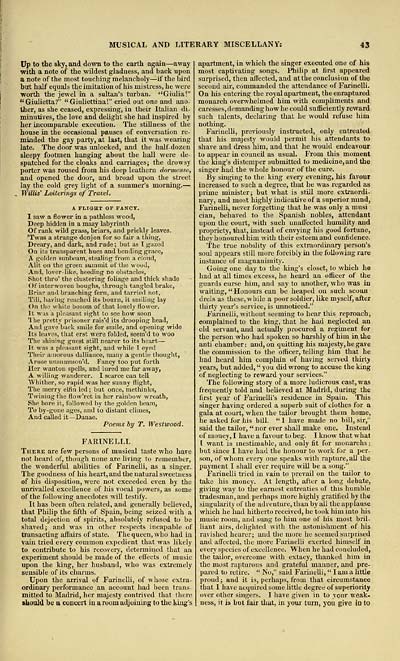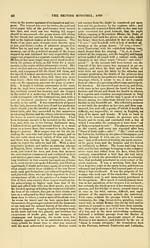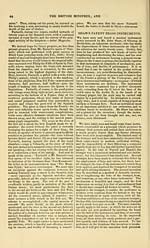Glen Collection of printed music > Printed music > British minstrel, and musical and literary miscellany
(51) Page 43
Download files
Complete book:
Individual page:
Thumbnail gallery: Grid view | List view

MUSICAL AND LITERARY MISCELLANY:
43
Up to the sky, and down to the earth again — away
with a note of the wildest gladness, and back upon
a note of the most touching melancholy — if the Ijird
but half equals the imitation of his mistress, he were
worth the jewel in a sultaja's turban. "Giulia!"
"Giulietta?" "Giuliettina!" cried out one and ano-
ther, as she ceased, expressing, in their Italian di-
minutives, the love and delight she had inspired l)y
her incomparable execution. The stillness of the
house in the occasional pauses of conversation re-
minded the gay party, at last, that it was wearing
late. The door was unlocked, and the half-dozen
sleepy footmen hanging about the hall were de-
spatched for the cloaks and carriages; the diowsy
porter was roused from his deep leathern dormcuse,
and opened the door, and broad upon the street
lay the cold grey light of a summer's morning. —
Willis' Loiterings of Travel.
A FLIOHT OF FANCY.
I saw a flower in a pathless wood,
Deep hidden in a mazy labyrinth
Of rank wild grass, briars, and prickly leaves.
*Twas a strange donjon for so fair a thing.
Dreary, and dark, and rude ; but as I gazed
On its transparent hues and bending grace,
A golden sunbeam, stealing from a cloud,
Alit on the green summit of the wood,
And, lover-like, heeding no obstacles.
Shot thro' the clustering foliage and thick shade
Of interwoven boughs, through tangled brake,
I5riar and branching fern, and tarried not,
Till, baviu}^ reached its bourn, it smiling lay
On the white bosom of that lonely Hower.
It was a pleasant sight to see how soon
The pretty prisoner rais'd its drooping head.
And gave back smile for smile, and opening wide
Its leaves, that erst were folded, seem'd to woo
The shining guest still nearer to its heart —
It was a pleasant sight, and while I eyed
Their amorous dalliance, many a gentle thought,
Arose unsummon'd. Fancy too put forth
Her wanton spells, and lured me far away,
A willing wanderer. I scarce can tell
"Whither, so rapid was her sunny flight,
The merry elfin led ; but once, methinks.
Twining the How'ret in her rainbow wreath.
She bore it, followed by the golden beam,
To by-gone ages, .and to distant climes.
And called it — Danae.
Poems by T. Westwood.
FARINELLL
There are few persons of musical taste who have
not heard of, though none are living to remember,
the wonderful abilities of Farinelli, as a singer.
The goodness of his heart, and the natural sweetness
of his disposition, were not exceeded even by the
unrivalled excellence of his vocal powers, as some
of the following anecdotes will testify.
It has been often related, and generally believed,
tliat Philip the fifth of Spain, being seized with a
total dejection of spirits, absohitely refused to be
shaved; and was in other respects incapable of
transacting affairs of state. The queen, who had in
vain tried every common expedient that was likely
to contribute to his recovery, determined that an
experiment should be made of the effects of music
upon the king, her husband, who was extremely
sensible of its charms.
Upon the arrival of Farinelli, of whose extra-
ordinary performance an account had been trans-
mitted to Madrid, her majesty contrived that there
sliotild be a concert in a room adjoining to the king's
apartment, in which the singer executed one of his
most captivating songs. Philip at first appeared
surprised, then all'ected, and at the conclusion of the
second air, commanded the attendance of Farinelli.
On his entering the royal apartment, the enraptured
monarch overwhelmed him with compliments and
caresses, demanding how he could sufficiently reward
such talents, declaring that he would refuse him
nothing.
Farinelli, previously instmcted, only entreated
that his majesty would permit his attendants to
shave and dress him, and that he would endeavour
to appear in council as usual. From this moment
the king's distemper submitted to medicine, and the
singer had the whole honour of the cure.
By singing to the king every evening, his favour
increased to such a degree, that he was regarded as
prime minister; but what is still more extraordi-
nary, and most highly indicative of a superior mind,
Farinelli, never forgetting that he was only a musi
cian, behaved to the Spanish nobles, attendant
upon the court, with such unaffected humility and
propriety, that, instead of envying his good fortune,
they honoured him with their esteem and confidence.
"The true nobility of this extraordinary person's
sold appears still more forcibly in the following rare
instance of magnanimity.
Going one day to the king's closet, to which he
had at all times excess, he heard an officer of the
guards curse him, and say to another, who was in
waiting, "Honours can be heaped on such scomi-
drels as these, while a poor soldier, like myself, after
lliirty year's service, is unnoticed."
Farinelli, without seeming to hear this reproach,
complained to the k-ing, that he had neglected an
old servant, and actually procured a regiment for
the person who had spoken so harshly of him in the
anti-chamber: and, on quitting his majesty, he gave
tlie commission to the officer, telling him that he
liad heard him complain of having served thirty
years, but added, " you did wrong to accuse the king
of neglecting to reward your services."
The following story of a more ludicrous cast, was
frequently told and believed at Madrid, during the
first year of Farinelli's residence in Spain. This
singer having ordered a superb suit of clothes for a
gala at court, when the tailor brought them home,
he asked for his bill. " I have made no biU, sir,"
said the tailor, " nor ever shall make one. Instead
of money, I have a favour to beg. I know that what
I want is inestimable, and only fit for inonarchs :
but since I have had the honour to work for a per-
son, of whom every one speaks with rapture, all the
payment I sliaU ever require will be a song."
Farinelli tried in vain to prevail on the tailor to
take his money. At length, after a long debate,
giving way to the earnest entreaties of this humble
tradesman, and perhaps more highly gratified by the
singularity of the adventure, than by all tlie applause
which he had liitherto received, he took him into his
music room, and sung to him one of his most bril-
liant airs, delighted with the astonishment of his
ravished hearer; and tlie more he seemed surprised
and affected, the more Farinelli exerted himself in
every species of excellence. When he had concluded,
the tailor, overcome with extacy, thanked him in
the most reipturous and gratefiil manner, and pre-
pared to retire. " No," said Farinelli, " I am a little
proud; and it is, perhaps, from that circumstance
that I have acquired some little degree of superiority
over other singers. I have given in to your weak-
ness, it is but fair that, in yom' turn, you give in to
43
Up to the sky, and down to the earth again — away
with a note of the wildest gladness, and back upon
a note of the most touching melancholy — if the Ijird
but half equals the imitation of his mistress, he were
worth the jewel in a sultaja's turban. "Giulia!"
"Giulietta?" "Giuliettina!" cried out one and ano-
ther, as she ceased, expressing, in their Italian di-
minutives, the love and delight she had inspired l)y
her incomparable execution. The stillness of the
house in the occasional pauses of conversation re-
minded the gay party, at last, that it was wearing
late. The door was unlocked, and the half-dozen
sleepy footmen hanging about the hall were de-
spatched for the cloaks and carriages; the diowsy
porter was roused from his deep leathern dormcuse,
and opened the door, and broad upon the street
lay the cold grey light of a summer's morning. —
Willis' Loiterings of Travel.
A FLIOHT OF FANCY.
I saw a flower in a pathless wood,
Deep hidden in a mazy labyrinth
Of rank wild grass, briars, and prickly leaves.
*Twas a strange donjon for so fair a thing.
Dreary, and dark, and rude ; but as I gazed
On its transparent hues and bending grace,
A golden sunbeam, stealing from a cloud,
Alit on the green summit of the wood,
And, lover-like, heeding no obstacles.
Shot thro' the clustering foliage and thick shade
Of interwoven boughs, through tangled brake,
I5riar and branching fern, and tarried not,
Till, baviu}^ reached its bourn, it smiling lay
On the white bosom of that lonely Hower.
It was a pleasant sight to see how soon
The pretty prisoner rais'd its drooping head.
And gave back smile for smile, and opening wide
Its leaves, that erst were folded, seem'd to woo
The shining guest still nearer to its heart —
It was a pleasant sight, and while I eyed
Their amorous dalliance, many a gentle thought,
Arose unsummon'd. Fancy too put forth
Her wanton spells, and lured me far away,
A willing wanderer. I scarce can tell
"Whither, so rapid was her sunny flight,
The merry elfin led ; but once, methinks.
Twining the How'ret in her rainbow wreath.
She bore it, followed by the golden beam,
To by-gone ages, .and to distant climes.
And called it — Danae.
Poems by T. Westwood.
FARINELLL
There are few persons of musical taste who have
not heard of, though none are living to remember,
the wonderful abilities of Farinelli, as a singer.
The goodness of his heart, and the natural sweetness
of his disposition, were not exceeded even by the
unrivalled excellence of his vocal powers, as some
of the following anecdotes will testify.
It has been often related, and generally believed,
tliat Philip the fifth of Spain, being seized with a
total dejection of spirits, absohitely refused to be
shaved; and was in other respects incapable of
transacting affairs of state. The queen, who had in
vain tried every common expedient that was likely
to contribute to his recovery, determined that an
experiment should be made of the effects of music
upon the king, her husband, who was extremely
sensible of its charms.
Upon the arrival of Farinelli, of whose extra-
ordinary performance an account had been trans-
mitted to Madrid, her majesty contrived that there
sliotild be a concert in a room adjoining to the king's
apartment, in which the singer executed one of his
most captivating songs. Philip at first appeared
surprised, then all'ected, and at the conclusion of the
second air, commanded the attendance of Farinelli.
On his entering the royal apartment, the enraptured
monarch overwhelmed him with compliments and
caresses, demanding how he could sufficiently reward
such talents, declaring that he would refuse him
nothing.
Farinelli, previously instmcted, only entreated
that his majesty would permit his attendants to
shave and dress him, and that he would endeavour
to appear in council as usual. From this moment
the king's distemper submitted to medicine, and the
singer had the whole honour of the cure.
By singing to the king every evening, his favour
increased to such a degree, that he was regarded as
prime minister; but what is still more extraordi-
nary, and most highly indicative of a superior mind,
Farinelli, never forgetting that he was only a musi
cian, behaved to the Spanish nobles, attendant
upon the court, with such unaffected humility and
propriety, that, instead of envying his good fortune,
they honoured him with their esteem and confidence.
"The true nobility of this extraordinary person's
sold appears still more forcibly in the following rare
instance of magnanimity.
Going one day to the king's closet, to which he
had at all times excess, he heard an officer of the
guards curse him, and say to another, who was in
waiting, "Honours can be heaped on such scomi-
drels as these, while a poor soldier, like myself, after
lliirty year's service, is unnoticed."
Farinelli, without seeming to hear this reproach,
complained to the k-ing, that he had neglected an
old servant, and actually procured a regiment for
the person who had spoken so harshly of him in the
anti-chamber: and, on quitting his majesty, he gave
tlie commission to the officer, telling him that he
liad heard him complain of having served thirty
years, but added, " you did wrong to accuse the king
of neglecting to reward your services."
The following story of a more ludicrous cast, was
frequently told and believed at Madrid, during the
first year of Farinelli's residence in Spain. This
singer having ordered a superb suit of clothes for a
gala at court, when the tailor brought them home,
he asked for his bill. " I have made no biU, sir,"
said the tailor, " nor ever shall make one. Instead
of money, I have a favour to beg. I know that what
I want is inestimable, and only fit for inonarchs :
but since I have had the honour to work for a per-
son, of whom every one speaks with rapture, all the
payment I sliaU ever require will be a song."
Farinelli tried in vain to prevail on the tailor to
take his money. At length, after a long debate,
giving way to the earnest entreaties of this humble
tradesman, and perhaps more highly gratified by the
singularity of the adventure, than by all tlie applause
which he had liitherto received, he took him into his
music room, and sung to him one of his most bril-
liant airs, delighted with the astonishment of his
ravished hearer; and tlie more he seemed surprised
and affected, the more Farinelli exerted himself in
every species of excellence. When he had concluded,
the tailor, overcome with extacy, thanked him in
the most reipturous and gratefiil manner, and pre-
pared to retire. " No," said Farinelli, " I am a little
proud; and it is, perhaps, from that circumstance
that I have acquired some little degree of superiority
over other singers. I have given in to your weak-
ness, it is but fair that, in yom' turn, you give in to
Set display mode to: Large image | Transcription
Images and transcriptions on this page, including medium image downloads, may be used under the Creative Commons Attribution 4.0 International Licence unless otherwise stated. ![]()
| Special collections of printed music > Glen Collection of printed music > Printed music > British minstrel, and musical and literary miscellany > (51) Page 43 |
|---|
| Permanent URL | https://digital.nls.uk/91435557 |
|---|
| Description | Scottish songs and music of the 18th and early 19th centuries, including music for the Highland bagpipe. These are selected items from the collection of John Glen (1833 to 1904). Also includes a few manuscripts, some treatises, and other books on the subject. |
|---|
| Description | The Glen Collection and the Inglis Collection represent mainly 18th and 19th century Scottish music, including Scottish songs. The collections of Berlioz and Verdi collected by bibliographer Cecil Hopkinson contain contemporary and later editions of the works of the two composers Berlioz and Verdi. |
|---|

